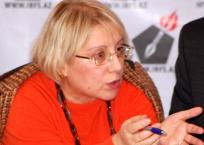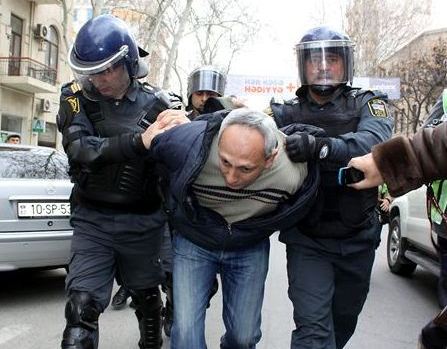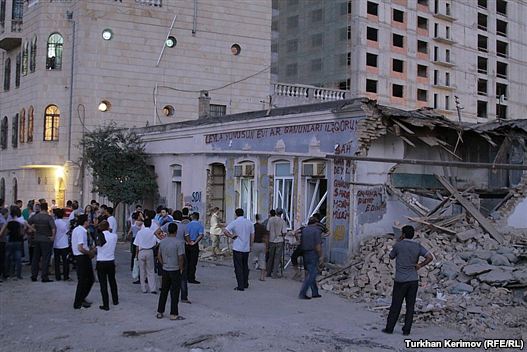The outrageous act by authorities of Baku was condemned by the international community. 52 NGOs from 14 different countries sent a public letter expressing their concern over the current human rights situation within Azerbaijan. NGOs asked Azerbaijani authorities to stop any illegal demolitions and ensure Azerbaijan’s commitments to international law. “The right of property is guaranteed under the first protocol of the European Convention of Human rights and which Azerbaijan is a party to. The actions also violate the provision of Article 13 and Article 28 of Azerbaijan Constitution and corresponding provisions of the Civil and Housing Codes,” – stated the organizations in the document.
The Human Rights House in Oslo joined the statement on behalf of its member organizations: FIAN Norge, Health and Human Rights Info,
Human Rights House Foundation, and Norwegian Helsinki Committee.
NHC calls to compensate the owners
The Norwegian Helsinki Committee (NHC) sent a letter to Azerbaijan authorities including Ministry of Foreign Affairs and the President Ilham Aliyev.
In the letter, the NHC called to investigate and make sure that the persons responsible for the demolition of the building in 38-1 and 2 Shamsi Bedalbeili Street in central Baku must be identified and brought to justice according to national legislation. NHC also calls for the government to compensate the owners of the building for the losses the demolition has brought upon them, as well as provide compensation the material losses of organisations situated in the building.
“Moreover, the Government of Azerbaijan should immediately cease the violation of the property rights of the people of Baku through forced evictions and unwarranted demolition. Those who have already been displaced should receive relocation assistance and adequate compensation for their loss”, – stated the letter signed by .
***
 A building of the Institute for Peace and Democracy was completely destroyed on 11 August by the authorities of Azerbaijan. The house which belongs to a prominent human rights defender Leyla Yunus, right, served as the premises for important human rights activity in Azerbaijan, including a crisis centre for women and fight against the extensive violation of property rights, was demolished by bulldozers in less than an hour. All documents, equipment and office inventory were either destroyed or taken by the officials; none of IPD staff were allowed to take anything from the building.
A building of the Institute for Peace and Democracy was completely destroyed on 11 August by the authorities of Azerbaijan. The house which belongs to a prominent human rights defender Leyla Yunus, right, served as the premises for important human rights activity in Azerbaijan, including a crisis centre for women and fight against the extensive violation of property rights, was demolished by bulldozers in less than an hour. All documents, equipment and office inventory were either destroyed or taken by the officials; none of IPD staff were allowed to take anything from the building.
Demolition itself was overseen by the officials from both state property committee and Baku mayor office. The on-going legal process regarding the future of building was finished in July, by Baku Administrative Economic Court, which ruled that destruction of the building is inadmissible without a court decision. Moreover the ruling was made known to all relevant authorities. Such outrages act by authorities suggests that the demolition of the property belonging to L.Yunus, may have been a punishment for her long-standing work, possibly triggered by a recent series of articles published in international media. Leyla Yunus has exposed and challenged in courts the arbitrary house evictions and demolition of homes and buildings taking place in Baku. Demolition of IPD building was condemned by United Nations high commissioner and NHC in the public letter to mayor of Baku.
Opposition crushed
 NGOs in Azerbaijan face serious obstacles to continue their work. The government restricts freedom of assembly, particularly for opposition parties. NGOs must register their grants with authorities and foreign NGOs and come to an agreement with the government before opening an office in Azerbaijan. To function as a legal entity, NGOs must register with the Ministry of Justice, a cumbersome and non-transparent process. The ruling regime has taken extremely harsh line against opposition activists, particularly after the April 2011 anti-government protests. Six Azerbaijani opposition activists were sentenced on August 25 to up to three years in prison.
NGOs in Azerbaijan face serious obstacles to continue their work. The government restricts freedom of assembly, particularly for opposition parties. NGOs must register their grants with authorities and foreign NGOs and come to an agreement with the government before opening an office in Azerbaijan. To function as a legal entity, NGOs must register with the Ministry of Justice, a cumbersome and non-transparent process. The ruling regime has taken extremely harsh line against opposition activists, particularly after the April 2011 anti-government protests. Six Azerbaijani opposition activists were sentenced on August 25 to up to three years in prison.
29 years old Bakhtiyar Hajiyev Harvard graduate, and the former parliament candidate organized the Facebook-event “Great Peoples Day” on March 11, calling for people to join the Facebook-group and to protest against the government. B. Hajiyev was arrested the following week, May 18, a court in Ganja sentenced Hajiyev to two years in prison for evading military service. The Court decision follows a string of arrests and convictions related to the March and April protests in the Azerbaijani capital Baku- demonstrating the ever tightening grip of President Ilham Aliyev. Another administrator of Facebook group, Strasbourg-based blogger Elnur Majidli, faces up to 12 years imprisonment on charges of publically appealing for the violent overthrow of power, based on his online activities calling for protests and criticising the authorities. Majidli is the first cyber activist based outside of Azerbaijan to be criminally charged.
Jabbar Salavan, another prominent human rights activist is facing similar charges. Savalan was among the first cyber activists targeted in connection with a series of pro-democracy protests inspired by uprisings in the Middle East and North Africa. J. Salavan was sentenced to 30 months’ imprisonment on politically motivated charges of drug possession. J.Savalan, who is a member of the opposition Popular Front Party, was arrested on 5 February 2011 after posting criticism of the authorities and calls for pro-democracy protests on his Facebook page. Savalan has no prior history of drug use or drug possession, and claims the drugs were planted on him by the police.
Sanctions do work
Despite the fact that most members of NGOs and political opposition may face criminal charges, the pressure from international community on Azerbaijan regime has given some positive results. Eynulla Fattulayev, editor-in-chief of “Realniy Azerbaydjan” and “Gundelik Azerbaycan” newspapers, returned to his home after spending more than four years in prison in Azerbaijan for writing articles critical to the regime.
may face criminal charges, the pressure from international community on Azerbaijan regime has given some positive results. Eynulla Fattulayev, editor-in-chief of “Realniy Azerbaydjan” and “Gundelik Azerbaycan” newspapers, returned to his home after spending more than four years in prison in Azerbaijan for writing articles critical to the regime.
The Human Rights House Network strongly contributed to the international advocacy efforts to release Fatullayev.
The European Court of Human Rights demanded his release more than one year ago, instead, however, he was was sentenced to 8.5 years in jail for threatening terrorism, amongst other charges. On April 22, 2010, the European Court of Human Rights ruled for his immediate release and financial compensation from the Azerbaijani government (27,800 EUR). The Azerbaijani Supreme Court Plenum has only partially fulfilled the decision The NHC is pleased to congratulate Eynulla and welcome him back to freedom. The case shows that pressure against the authorities works. The pressure must continue.
Freedom House has recently published a report assessing overall situation of free media in Azerbaijan. One of the most disturbing findings is increasing self-censorship among journalists. The culture of impunity in Azerbaijan has led to a climate of pervasive self-censorship, and journalists adjust to this. Unable to report the political and social situation accurately, journalists often avoid particular subjects. Journalists and bloggers who spoke with the mission noted that, for example, reporting on the president or his family or any of their business dealings is considered off-limits, as is criticism of government officials or debate about religion. But it is becoming increasingly difficult to identify dangerous subjects because it has become evident that those who commit acts of violence against reporters, editors and columnists go unpunished, a journalist working in almost any field, writing about any topic, may find him or herself vulnerable to attack.
Related stories
52 organisations jointly condemn demolishion of Leyla Yunus house in Baku
Wrongfully imprisoned Azerbaijani journalist released after four years in jail
Activist’s office targeted in Azerbaijan, Eynulla Fatullayev received compensation





